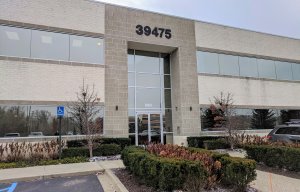
Asahi Kasei America opens new marketing base in Michigan
Drawing on 90 years of advanced fibre know-how.

24th August 2022
Innovation in Textiles
|
Japan
Japanese technology company Asahi Kasei will present its latest concept car AKXY2 for the first time in Europe at the K 2022, from 19-26 October in Düsseldorf, Germany.
Utilising a broad variety of materials and technologies, the vehicle showcases the company’s cross-divisional expertise throughout the entire value chain. Other highlights at the company’s K stand will include innovative particle foams, bio-based filler materials and sustainable engineering plastics.
AKXY2 made its debut in 2022, in line with Asahi Kasei’s 100th anniversary. It demonstrates how the company applies expertise throughout the entire value chain, from raw materials and production technologies to the use of recycled and recyclable materials. Virtually everything that can been seen, touched or felt in the vehicle is either manufactured or co-developed by Asahi Kasei. The car features technology that touches the senses, improves safety and ensures the highest functionality while proposing solutions to reduce the environmental impact of vehicles. All windows are made of outsourced hard-coated polycarbonate through a manufacturing method developed by Asahi Kasei in 2002 that uses CO2 as a raw material for its production. Today, 15% of the global polycarbonate production uses this production technology. To enable polycarbonate for applications in automotive windshields, Asahi Kasei is currently developing a hard-coating technology that equips polycarbonate with a UN ECE R43 standard-compliant resistance to abrasion and weatherability. Replacing glass with this polycarbonate will significantly reduce vehicle weight and extend EV driving range.
Dinamica
The interior surfaces are covered by Dinamica – a premium microfibre resembling suede partially made of recycled polyester – manufactured by Miko, an Italian subsidiary of Asahi Kasei Group company Sage Automotive Interiors. Sage Automotive Interiors can also provide other more sustainable fabrics utilising raw materials that range from recycled PET, bio-based PET, natural blends, and ocean waste.
An improved lifetime of materials is another way to achieve a greener mobility. All fabrics can be made anti-viral and anti-bacterial, as well as fluid-repellent and stain-resistant. AZP, a transparent optical polymer on the interior display, features ultra-low birefringence and ensures a perfect screen visibility without rainbow effects. The interior is also featuring light technology, using semi-transparent and backlit fabrics made of PET, but also ultra-thin plastic-optical fibres woven into different surfaces.
SunForce
Asahi Kasei’s SunForce family of innovative particle foams are based on engineering plastics and processable on standard foam molding equipment, opening up new application fields for foams. SunForce BE is based on modified polyphenylene ether (mPPE) and features an unmatched combination of lightweight, UL94 V-0 flame retardance, thin-wall moldability, thermal insulation and processability. At K 2022, Asahi Kasei will display 4680 and 2170 round cell holders made of this material. In this application the material allows for the precise fixation and alignment of round cells without the use of any adhesives. The material is also suitable for battery pack applications for any other kind of cell design like pouch-cells and prismatic cells. SunForce™ AS is based on polyamide and features the typical properties of this engineering polymer. Its high stiffness and strength make it an ideal material for metal replacement in structural automotive components. This type also has the highest chemical and heat resistant properties in the product family.
Cellulose
Asahi Kasei’s expertise in the field of cellulose goes back 90 years to when it first started sales of Cupro fiber under the trade name Bemberg. The company is now adapting this know-how to other application fields and developing a cellulose-based nanofibre filler material (CNF). Featuring a substantially higher purity than conventional wood-based cellulose, CNF is derived from cotton-linter, a byproduct of cotton yield. As an alternative to glass fiber, CNF can be used in engineering plastics like polyamide 6, polyamide 66 and polyacetal with a ratio of up to 20% by weight.
Asahi Kasei will also display its Leona SG grades – a family of semi-aromatic polyamides featuring excellent mechanical strength, processability and surface quality – as well as the modified polyphenylene ether Xyron for 5G applications.

Business intelligence for the fibre, textiles and apparel industries: technologies, innovations, markets, investments, trade policy, sourcing, strategy...
Find out more